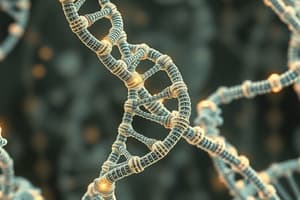Podcast
Questions and Answers
What is the purpose of DNA ligase in molecular cloning?
What is the purpose of DNA ligase in molecular cloning?
- To join DNA fragments together by catalyzing the formation of phosphodiester bonds (correct)
- To unwind the DNA double helix during replication
- To transcribe mRNA from a DNA template
- To degrade foreign DNA in a bacterial cell
Why must eukaryotes wait until transcription is complete before beginning translation?
Why must eukaryotes wait until transcription is complete before beginning translation?
- To ensure proper binding of tRNA to the ribosome
- To prevent interference from RNA polymerase during translation
- To allow for the processing of pre-mRNA, including capping, splicing, and polyadenylation (correct)
- To regulate the availability of ribosomes for translation
If a strain of E. coli has a mutation in the operator of the trp operon that prevents binding by a repressor, will the operon be transcribed in the presence of tryptophan?
If a strain of E. coli has a mutation in the operator of the trp operon that prevents binding by a repressor, will the operon be transcribed in the presence of tryptophan?
- No, the operon will not be transcribed
- Depends on the presence of an activator
- Yes, the operon will be transcribed (correct)
- Depends on the absence of glucose
Why is the lac operon off by default in E. coli?
Why is the lac operon off by default in E. coli?
How are histone modifications used to alter the transcription of a gene?
How are histone modifications used to alter the transcription of a gene?
What is the difference between a general transcription factor and a specific transcription factor?
What is the difference between a general transcription factor and a specific transcription factor?
What prevents an mRNA from existing in the cell forever and being translated forever?
What prevents an mRNA from existing in the cell forever and being translated forever?
How can a microRNA stop translation of a specific mRNA, but not all mRNAs in the cell?
How can a microRNA stop translation of a specific mRNA, but not all mRNAs in the cell?
What are the advantages or disadvantages for a eukaryote to regulate the amount or activity of a protein in a cell via transcriptional control vs. post-translational control?
What are the advantages or disadvantages for a eukaryote to regulate the amount or activity of a protein in a cell via transcriptional control vs. post-translational control?
What prevents alternative splicing from changing the order of exons in an mRNA transcript?
What prevents alternative splicing from changing the order of exons in an mRNA transcript?
Flashcards are hidden until you start studying




